The U.S. District Court for the District of Columbia affirmed the Copyright Office’s denial of a copyright registration for a work of art created by an artificial intelligence (AI) computer system. Plaintiff Stephen Thaler sought to register a copyright based on visual art his computer system created, and the Copyright Office denied the application based on lack of human authorship. Courts have addressed the human authorship requirement for some time, most notably in a case arguing that a gorilla is not the author of a copyright in a photograph he took and, in another case, arguing that an AI is not the author of a copyright. This case now addresses whether the human owner and creator of an AI is the author of a work his AI creates.
In affirming the Copyright Office’s denial of Thaler’s copyright request, the District Court emphasized the requirement for human authorship for something to be copyrightable. The Court noted this principle follows from the plain text of the Copyright Act of 1976, which requires a work to be fixed “by or under the authority of the author.”
While the word “author” is not defined in the Copyright Act, the text requires a copyrightable work to have an originator with the capacity for intellectual, creative, or artistic labor. The Court stated this means that the originator must be a human. The Court noted this interpretation aligns with prior Supreme Court decisions which assessed that authorship centers on human creativity.
In this instance, Thaler owned a system called the “Creativity Machine” which, according to his application with the Copyright Office, autonomously created the work at issue. Accordingly, Thaler’s claim of copyright authorship was based on his ownership and creation of the machine through a work made for hire theory. Later, in the District Court decision, Thaler attempted to introduce new facts that he provided instructions to the AI to create the work. However, the Court’s judicial review of the Copyright Office’s decision was limited to the administrative record, and therefore these new facts introduced by Thaler were not considered.
Interestingly, the District Court spent some time explaining why authorship might be a tricky issue in future cases when there is more human input involved in the AI’s creation, for example, whether a person can claim copyright authorship by inputting a prompt for the AI to create art that the AI carries out. However, since this case involved no human input based on the application presented to the Copyright Office, from the Court’s standpoint it was easy to decide. The Court also dismissed Thaler’s work-for-hire theory because the underlying work was not eligible for copyright protection.
This case shows the necessity of human authorship in obtaining a copyright and provides a glimpse into the complex situations that may arise over how much human intervention is needed to claim authorship.
The visual art Thaler’s AI created:

Irwin IP is pleased to announce that Barry F. Irwin has been recognized as an IP Star for Illinois in the 2023 edition of IP STARS.
Since 1990, IP STARS has been a leading specialist guide for companies and individuals looking for experienced legal practitioners to handle their intellectual property related issues. Research, rankings, and analysis by IP STARS provides impartial accreditation across 151 jurisdictions, covering 1,645 firms and 7,100 practitioners.
Attorneys representing the U.S. Patent and Trademark Office, Taiwanese manufacturers of automotive components, and significant insurance trade associations have submitted their opinions to the Federal Circuit regarding a legal initiative presented by a competitor of General Motors. This initiative seeks to alter the process by which courts render judgments concerning design patents.
Read the full article at: USPTO, Car Cos., Profs Tell Fed. Circ. About Design Patents – Law360
*This article is located behind a paywall and is only available for viewing by those with a subscription to Law360.
Irwin IP LLP is pleased to announce that four Associates have earned recognition in the 2024 Edition of Best Lawyers: Ones to Watch.
Best Lawyers: Ones to Watch recognizes associates and other lawyers who are earlier in their careers for their outstanding professional excellence in private practice in the United States.
”Best Lawyers was founded in 1981 with the purpose of recognizing extraordinary lawyers in private practice through an exhaustive peer-review process. Nearly 40 years later, we are proud to expand our scope, while maintaining the same methodology, to recognize a different demographic of talented and deserving lawyers in Best Lawyers: Ones to Watch,” says Phil Greer, CEO of Best Lawyers.
Lawyers recognized in Best Lawyers: Ones to Watch are divided by geographic region and practice areas. They are reviewed by their peers based on professional expertise and undergo an authentication process to make sure they are in current practice and in good standing.
Irwin IP LLP would like extend congratulations to the following lawyers recognized in the 2024 Edition of Best Lawyers: Ones to Watch:
- Victoria Hanson – Intellectual Property Law, Litigation – Intellectual Property, and Litigation – Patent
- Ted Mahan – Intellectual Property Law, Litigation – Intellectual Property, and Litigation – Patent
- Alexa Tipton – Entertainment and Sports Law, Intellectual Property Law, and Nonprofit/Charities Law
- Nicholas Wheeler – Litigation – Patent
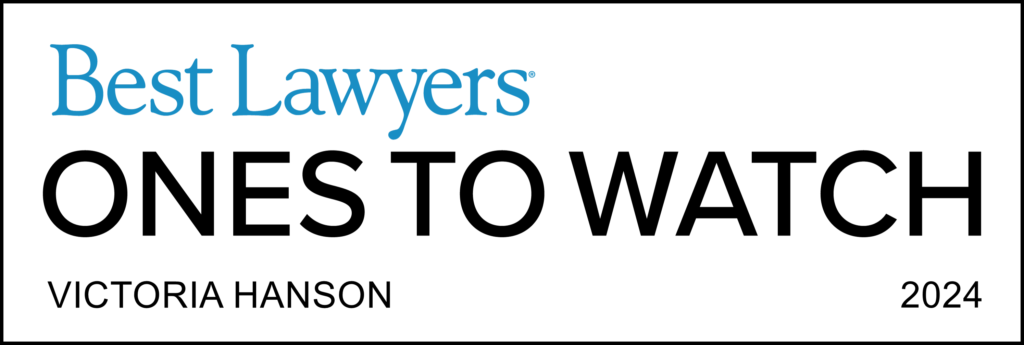
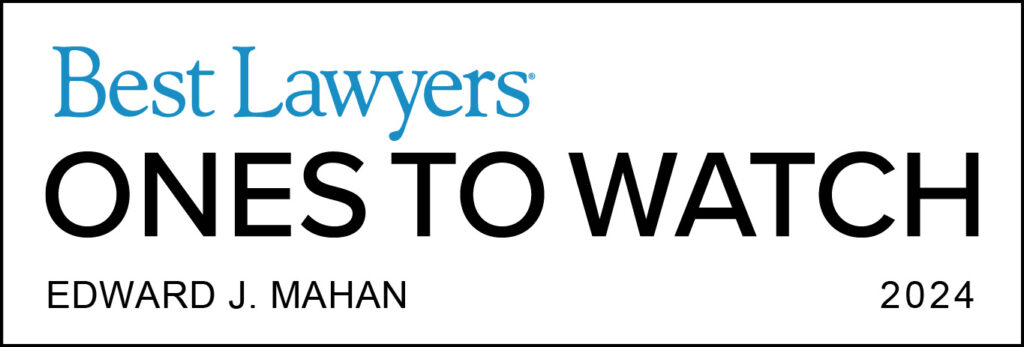
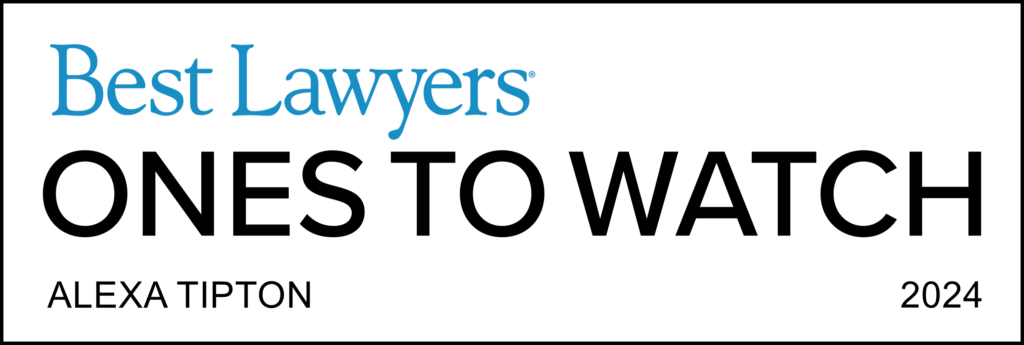
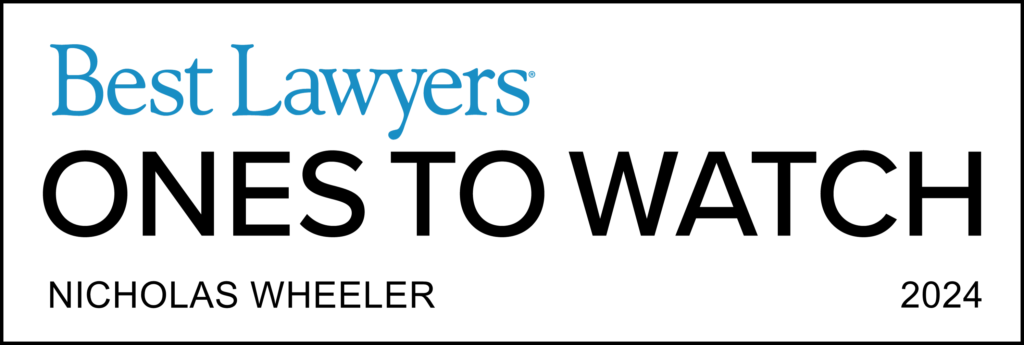
Irwin IP LLP is pleased to announce that three Attorneys have earned recognition in the 2024 edition of The Best Lawyers in America®. Since it was first published in 1983, Best Lawyers has become universally regarded as the definitive guide to legal excellence.
“Best Lawyers was founded in 1981 with the purpose of highlighting the extraordinary accomplishments of those in the legal profession,” said Best Lawyers CEO Phillip Greer. “We are proud to continue to serve as the most reliable, unbiased source of legal referrals worldwide.”
Best Lawyers has earned the respect of the profession, the media, and the public as the most reliable, unbiased source of legal referrals. Its first international list was published in 2006 and since then has grown to provide lists in over 75 countries.
Lawyers on The Best Lawyers in America list are divided by geographic region and practice areas. They are reviewed by their peers based on professional expertise and undergo an authentication process to make sure they are in current practice and in good standing.
Irwin IP LLP would like to congratulate the following lawyers named to the 2024 The Best Lawyers in America list:
- Barry F. Irwin – Copyright Law, Litigation – Intellectual Property, Litigation – Patent, and Patent Law
- Jason Keener – Litigation – Intellectual Property
- Reid Huefner – Patent Law



In a significant development, Chicago parts maker LKQ Corp. engaged in a dispute with General Motors have presented its arguments before the full federal circuit.
To read the full article, visit: https://www.law360.com/articles/1695844/gm-foe-says-it-s-time-for-some-new-design-patent-rules
*This article is located behind a paywall and is only available for viewing by those with a subscription to Law360.
Addressing not one but three matters of first impression, the Ninth Circuit held that willful blindness giving rise to contributory trademark infringement requires a defendant to have specific knowledge of specific infringers or acts of infringement and without specific knowledge there is not a duty to search whether third parties are using the defendant’s property for infringement. The Court also held that the Lanham Act does not authorize prejudgment interest for statutory damages awards. Finally, the Court held that the District Court abused its discretion in deciding that prelitigation delay alone rebutted the statutory presumption of irreparable injury. The Court remanded the case back to the Central District of California on the issues of contributory infringement and whether to grant a permanent injunction, while affirming denial of prejudgment interest.
Italian clothing seller Y.Y.G.M. SA d/b/a Brandy Melville – known for selling clothes in only one size – sued Redbubble, Inc. – an online marketplace where artists can upload images and have them printed on various products to be sold. Redbubble collects payment, sends orders to third parties who print images on (for example) t-shirts, arranges shipping, and handles refunds; it does not inspect or take possession of any goods before they are shipped to customers in Redbubble packaging. In 2018, Brandy Melville notified Redbubble that items on Redbubble infringed Brandy Melville’s heart and lightening trademarks. Redbubble took those items down. One year later, Brandy Melville filed suit under the Lanham Act. A jury found Redbubble liable for (among other things) willful contributory trademark infringement for the sale by third parties on its site of goods bearing plaintiff’s marks; the District Court then denied a permanent injunction and denied prejudgment interest. Both parties appealed.
The Ninth Circuit agreed with case law from other Circuits in reaching its contributory infringement decision regarding specific knowledge and willful blindness. As for question of delay and how it impacts irreparable harm in the context of a request for permanent, as opposed to a preliminary, injunction, this is one of the few Circuit Court decisions to examine that issue since the Trademark Modernization Act of 2020. Because the Court held delay alone was insufficient, the Ninth Circuit directed the lower court to consider what other evidence might be present to rebut the statutory presumption of irreparable harm. The lower court decision will be one to watch for defendants considering how to argue against permanent injunctions. Lastly, the Court’s holding that there is no prejudgment interest available on a statutory damages award is notable given that other courts, such as the Second Circuit, have held otherwise. Plaintiffs seeking statutory damages for trademark counterfeiting may want to avoid the Ninth Circuit and file where the question of such monetary enhancement is left to the discretion of the court.

On remand from the Sixth Circuit, the Eastern District of Michigan (“District Court”) declined FCA US LLC’s (“Jeep”) motion to enjoin importation of rival automaker Mahindra’s post-2020 ROXOR utility terrain vehicle (“UTV”). The Sixth Circuit had reversed the District Court for failing to analyze the factors for applying the “safe distance rule.” On remand, the District Court held that even if the original infringement was willful, redesigning the product in good faith militates against applying the rule.
Jeep filed an International Trade Commission (ITC) action alleging the 2018-2019 ROXOR infringed Jeep’s trade dress, which covers six aspects of certain Jeep Wrangler models’ appearance. Mahindra filed a parallel District Court lawsuit seeking declaratory judgment of non-infringement. The ITC found the 2018-2019 ROXOR, which evoked the look of the Willys/Jeep CJ that Mahindra had been licensed to build and sell abroad since 1947, infringed Jeep’s trade dress and barred Mahindra from importing or selling it in the U.S. Mahindra redesigned the ROXOR to avoid Jeep’s trade dress. It sought and, over Jeep’s opposition, obtained a modification of the ITC exclusion order to allow importation and sale of the post-2020 ROXOR in the U.S.
Having lost before the ITC, Jeep sought an injunction against the post-2020 ROXOR in the co-pending District Court action on the basis that the redesigned vehicle still infringed, at least under the “safe distance rule.” That rule, if it applied, would have required Mahindra to change their trade dress to one so far removed from the Jeep trade dress they had infringed so as to put the public on notice that the two are not related. The rule is intended to prevent infringers from capitalizing on lingering confusion from their past infringement. The ITC had found the rule inapplicable based on lack of likelihood of consumer confusion. The District Court relied on the ITC’s determination to also reject Jeep’s request, but the Sixth Circuit reversed on the basis that the District Court had failed to consider the other factors relevant to whether the rule should apply: whether Mahindra’s infringement was abusive or in bad faith.
On remand, the District Court again found the safe distance rule inapplicable. Notably, the Court found that even though the original infringement was in bad faith, that was offset by the fact that the redesign was non-abusive (of Jeep’s goodwill) and in good faith. The District Court further found no likelihood of lingering confusion because the redesigned product was “drastically different” than Jeep’s trade dress.
This case illustrated two different conceptions of the safe distance rule: Jeep’s, where the infringer’s initial willfulness was incurable and would trap them out of the market even with an otherwise non-infringing product; and Mahindra’s, where a willful infringer could escape the yoke of past infringement via good faith redesign. The District Court deemed Mahindra and its Not-a-JeepTM UTV deserving of redemption.
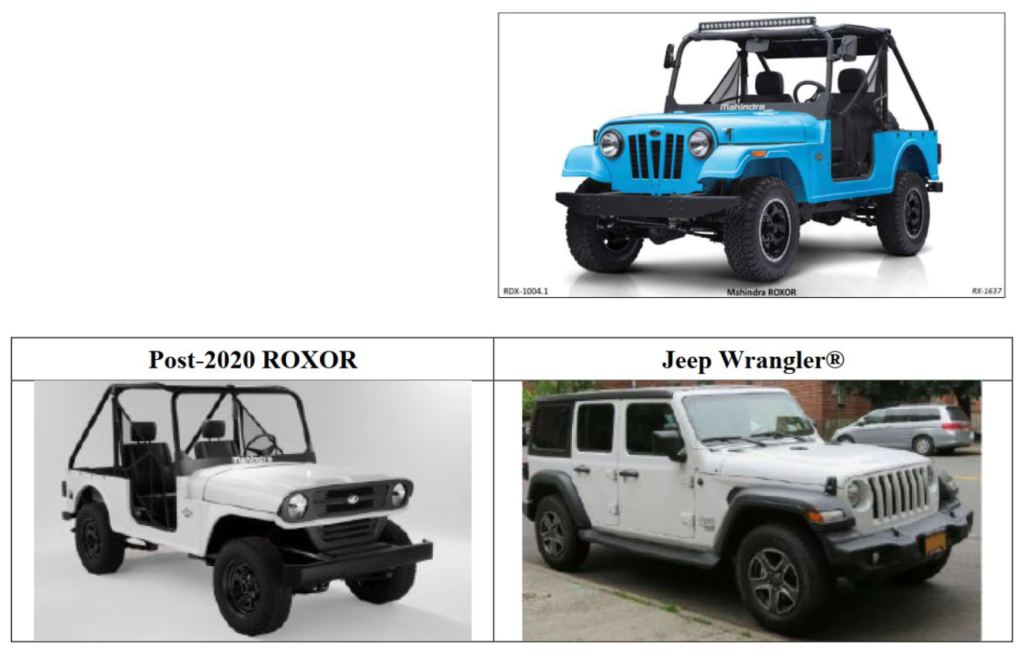
Be cautious when deciding whether to do business in a state in a way that requires you to register in that state; you may be consenting to general personal jurisdiction in that new state by doing so. On June 27, 2023, the Supreme Court held that Pennsylvania’s consent statute—which requires out-of-state corporations to consent to general personal jurisdiction in Pennsylvania courts as a requirement for registering to do business in Pennsylvania—was constitutional under the Due Process Clause.
Robert Mallory (“Mr. Mallory”) sued Norfolk Southern Railway Co. (“Norfolk”) under the Federal Employers’ Liability Act due to his belief that his cancer was attributable to the work he conducted for Norfolk. Mr. Mallory filed his lawsuit in Pennsylvania state court. Norfolk asserted it was not subject to personal jurisdiction in Pennsylvania under the Due Process Clause of the Fourteenth Amendment because Norfolk is incorporated and headquartered in Virginia. Norfolk further argued that Mr. Mallory resided in Virginia when he filed his complaint and that Mr. Mallory was exposed to carcinogens only in Ohio and Virginia. In rebuttal, Mr. Mallory argued Norfolk was subject to general personal jurisdiction because Norfolk had a large presence in Pennsylvania due to Norfolk managing over 2,000 miles of track, 11 railyards, and 3 locomotive repair shops in Pennsylvania and because Norfolk consented to general personal jurisdiction in Pennsylvania, under 15 Pa. Cons. Stat. § 411(a), when it registered to do business in Pennsylvania. The Pennsylvania Supreme Court agreed with Norfolk; Mr. Mallory appealed to the Supreme Court.
On appeal, the Supreme Court found Norfolk to be subject to jurisdiction in Pennsylvania. Largely ignoring the underlying facts of the case, the Supreme Court held that neither the fact that Mr. Mallory no longer lived in Pennsylvania nor that his claim accrued outside of Pennsylvania made a difference in whether Norfolk was subject to general personal jurisdiction in Pennsylvania because the statutory language was clear and did not violate due process. The Court noted how the Pennsylvanian law provides that an out-of-state corporation “may not do business in this Commonwealth until it registers with” the Department of State. Id. The state law also requires a corporation to identify an “office” that will be “continuously maintain[ed]” in the state. Mallory,143 S. Ct. 2028 at 2037. Further, the Pennsylvanian law is “explicit” in requiring that “qualification as a foreign corporation” shall permit state courts to “exercise general personal jurisdiction” over a registered foreign corporation, just like domestic corporations. Id. Norfolk complied with the state law for over 20 years by registering in the state, regularly updating its information with the Department of State, and naming a “Commercial Registered Office” where it was “deemed … located.” Id. In light of these facts, the Supreme Court held that Norfolk agreed to be found in Pennsylvania for over 20 years—including the ability to answer for any suit in Pennsylvania—and that these actions subjected Norfolk to general personal jurisdiction in Pennsylvania. The Supreme Court further held that this decision was not in opposition to more recent personal jurisdiction case law because recent personal jurisdiction cases did not prohibit state consent statutes.
In light of this contentious 5-4 split decision, businesses must carefully consider whether to do business and register to do business in a state where registration is contingent upon acceding to a broad, general-jurisdiction consent requirement that could result in an obligation to litigate any claim there.

By choosing to ‘embed’ social media posts, BuzzFeed News and Time avoided copyright liability due to unauthorized display of two photographers’ Instagram content. Embedding occurs when a website links to content from another website to display on the site, without re-storing the content. In Hunley v. Instagram, the Ninth Circuit affirmed dismissal of the secondary infringement claims against Instagram because the embedded content did not constitute direct infringement under circuit precedent. Did the Ninth Circuit provide a roadmap for a website to put any copyrighted images, videos, or music on their site without any liability as long as it is embedded?
Hunley owns the copyright to a photograph related to the Black Lives Matter protests; co-appellant Brauer owns the copyright to a photograph and an accompanying written post related to then-candidate Hilary Clinton. Both works were included in Instagram posts, where Instagram holds a license to display the content. BuzzFeed and Time ‘embedded’ the copyrighted works on their sites, using Instagram’s embedding software tool to add a block of code that renders the posts. Importantly, copies were not hosted or stored on Buzzfeed’s or Time’s websites with the embedded content. Thus, explained the court, display of the photographs does not meet the statutory definition for “display[ing] a copy” under Perfect 10 v. Amazon.
Reviewing application of its Perfect 10 Server Test, the court reasoned that BuzzFeed and Time “wrote the HTML instructions that caused browsers to show” the copyrighted works, but “under Perfect 10 these instructions did not constitute ‘display [of] a copy’”. The court stated that such embedding instructions did not include storing of the work, so no direct infringement existed. Without direct infringement, the photographers’ claims that Instagram was liable for indirect infringement failed.
Hunley’s argument that the Server Test should be limited to search engines or automated indexes was rejected due to factual distinctions in the cases argued by Hunley. Hunley also argued that Perfect 10 was overturned by the Supreme Court’s decision in American Broadcasting Company v. Aereo, 573 U.S. 431 (2014). The court was unpersuaded, concluding that the right to public performance at issue in Aereo involved a provision of the Copyright Act related to retransmission liability, a separate question from what constitutes “display” of a “copy”.
To a website user, a site looks identical regardless of whether an image is stored or embedded, which provides an avenue for avoiding copyright liability. However, website owners should be aware that whoever is hosting the content could delete or change it, which could obviously lead to an unintended result for site visitors. Outside the Ninth Circuit, the viability of the Server Test remains in question.

